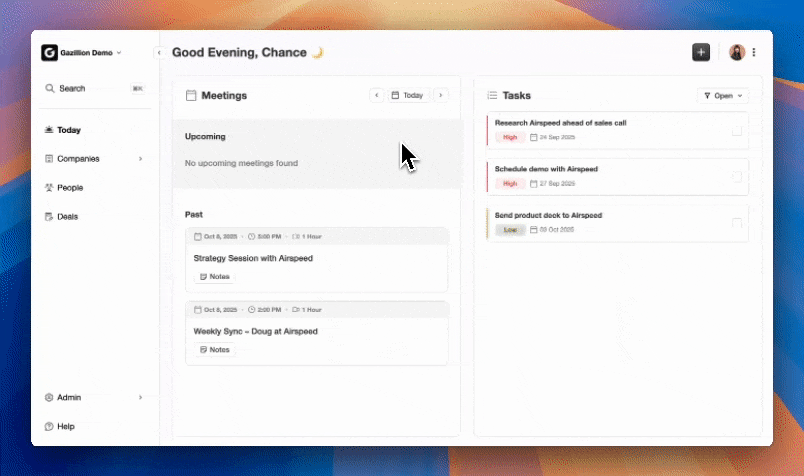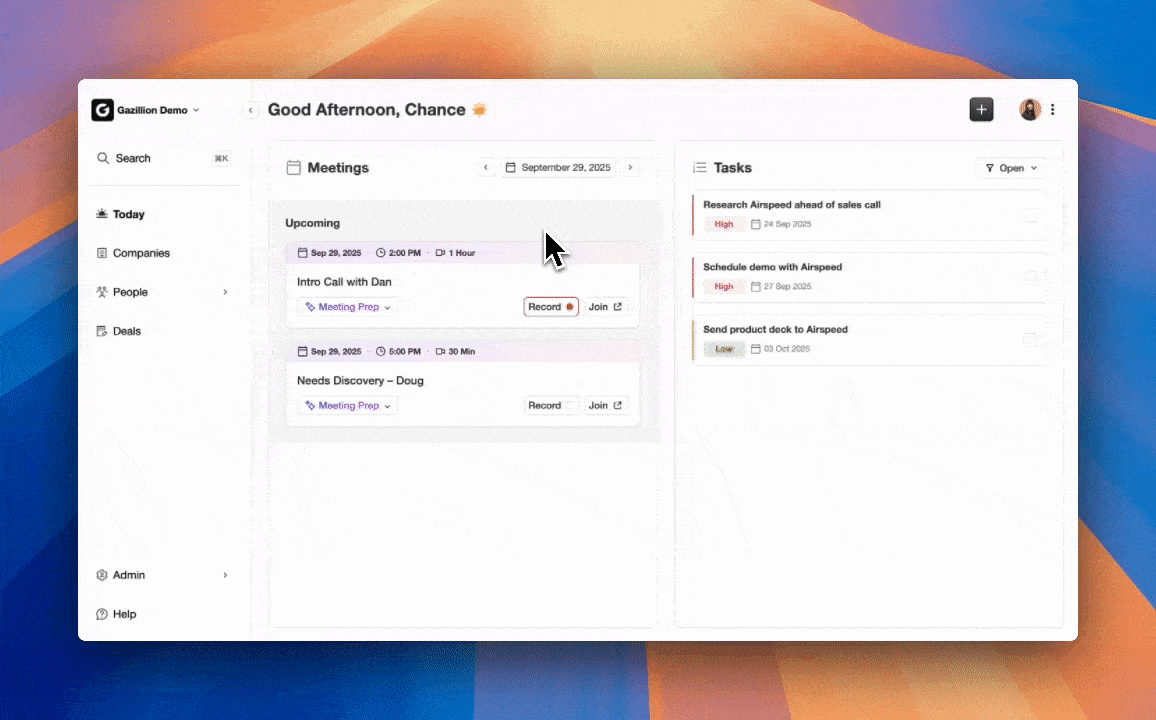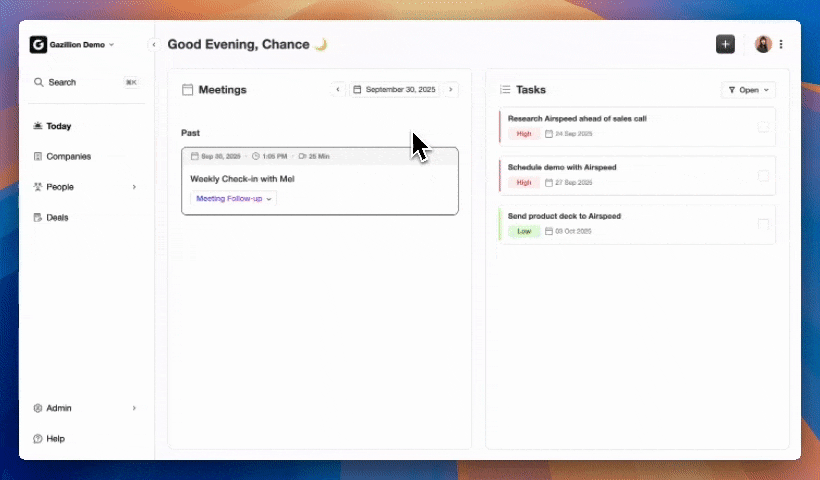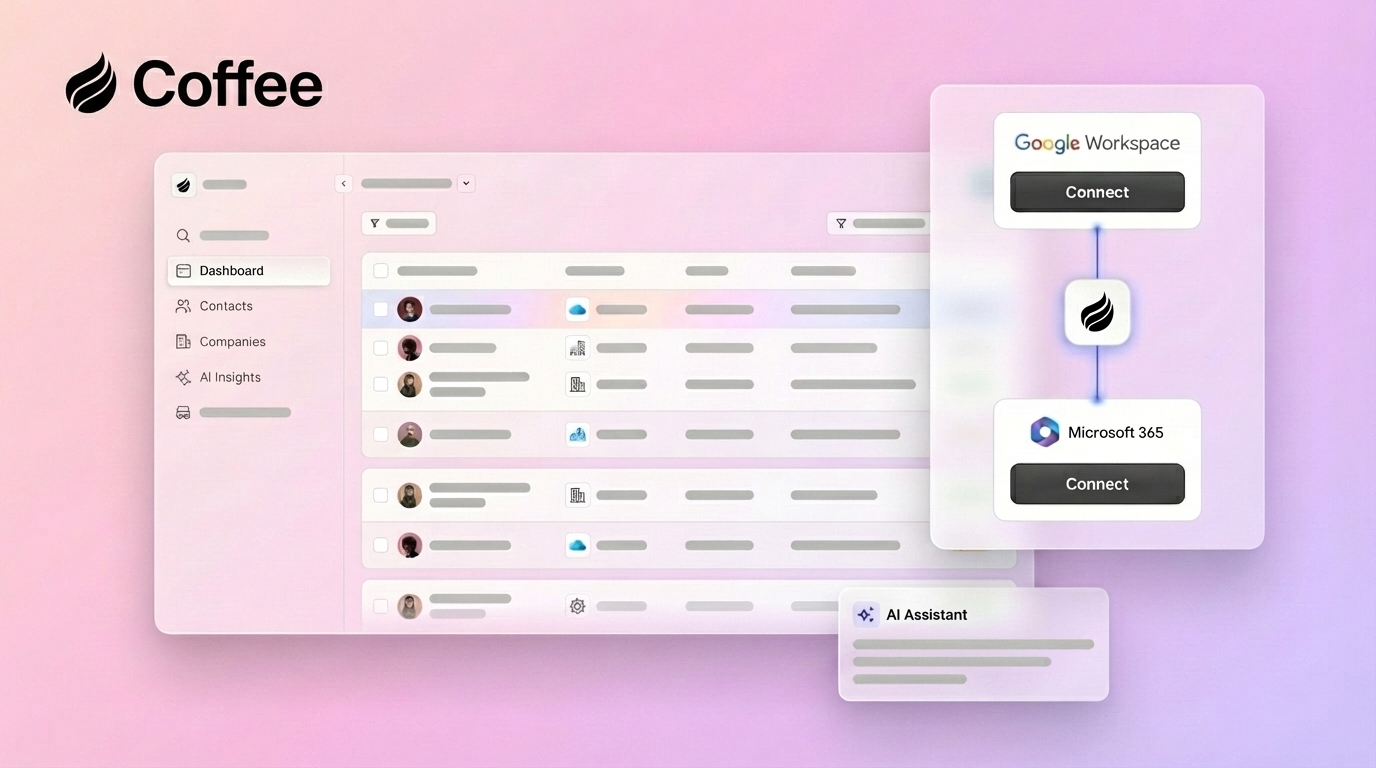Key Takeaways
- Customer data management in 2026 shifts from static record-keeping to active intelligence that supports faster, more accurate decisions.
- Legacy CRMs struggle with data quality, manual entry, and unstructured data, which limits forecasting and customer visibility.
- Agent-led CDM systems improve data capture, enrichment, and analysis, creating reliable, actionable customer and pipeline insights.
- Successful CDM programs depend on change management, clear governance, and realistic implementation planning, not only on technology choice.
- Coffee offers an AI-powered CDM platform that automates data work and meeting workflows so teams can focus on revenue. Get started to see how it fits your team.
The Strategic Context: Why Legacy CDM Approaches Are Failing
Many traditional CRM systems now function more as administrative overhead than strategic infrastructure. They depend on manual data entry, which breaks down as teams grow and customer interactions span more channels.
Sales representatives in these systems often move between tools for enrichment, outreach, and meeting management. That fragmentation creates data silos and partial records, which weakens the value of reports and dashboards. In many teams, 71% of sellers report spending excessive time entering data, and only about a third of their time goes to actual selling.
These platforms also struggle with unstructured data such as emails, calls, and meeting notes. CRM updates often overwrite context instead of preserving the full history, so leaders lose a clear view of relationship momentum and deal risk.
Get started with Coffee to reduce manual data entry and build a more complete, accurate picture of every account.
The Agent Inflection Point: Transforming Customer Data Management with AI
AI agents change customer data management from passive storage to active, ongoing work. Rather than waiting for humans to log activities, agents capture, interpret, and organize data in real time.
Agent-led systems process both structured objects and unstructured content. They can read emails and transcripts, link activities across tools, and maintain living customer profiles. Because they enrich and validate data at the point of capture, these systems produce cleaner datasets that support reliable forecasting and strategic planning.
The 2026 Landscape: Strategic Imperatives for Advanced CDM
Customer data strategies in 2026 must balance privacy, security, and insight. Regulations continue to tighten, so organizations need architectures that respect consent and retention rules without blocking day-to-day selling and support.
Teams also expect real-time visibility into customer activity. That expectation favors agent-led approaches that automate capture and analysis, provide timely context for every interaction, and enable consistent experiences across marketing, sales, and success.
Get started to align Coffee with your 2026 CDM, privacy, and go-to-market requirements.
Strategic Advantages of Agent-Led Customer Data Management
Agent-led CDM systems provide leverage across data quality, team productivity, and revenue planning. They centralize work that used to be spread across several tools and manual processes.
Automated Data Entry and Enrichment
AI agents create and update contacts, companies, and activities from email and calendar data with no manual effort. They enrich records with roles, company details, and other firmographic data sourced from licensed providers, so profiles stay current with minimal supervision.

This automation reduces busywork, limits data entry errors, and keeps every interaction tied to the right people and accounts.
Meeting Intelligence and Workflow Automation
Agent-led CDM platforms provide structured support before, during, and after meetings. They prepare short briefs on attendees, surface relevant history, and then generate notes, action items, and suggested follow-ups once the meeting ends.

Those outputs sync back into the CDM, so relationship context and next steps are always documented and searchable.
Pipeline Intelligence and Forecasting Accuracy
Because activities and changes are logged automatically, leaders gain a consistent view of pipeline health. Agent-led systems track movement through stages, flag stalled deals, and highlight shifting risk, which supports more confident forecasts and focused pipeline reviews.
Technology Stack Consolidation
Modern CDM agents reduce the need for extra tools for data enrichment, meeting capture, activity tracking, and basic analytics. Fewer tools mean simpler onboarding, less context switching, and lower software spend, while agents still keep data synchronized across the remaining core systems.
Implementation Framework: Coffee’s Dual-Model Strategy
Coffee supports both organizations that want to replace legacy CRMs and those that want to improve the systems they already have. The same agent engine powers each approach.
Standalone AI-First CRM
Teams that need a fresh start can adopt Coffee as their primary CRM. This option fits smaller and growing companies that have outgrown spreadsheets or basic tools but do not want to manage a complex legacy platform.
The standalone Coffee environment delivers immediate value with automated contact creation, enrichment, and activity tracking. Sellers and founders can spend more time with customers while the Coffee Agent maintains accurate records in the background.
Companion App for Existing Systems
Organizations invested in Salesforce or HubSpot can use Coffee as a companion layer. The agent handles data capture and enrichment, then syncs updates into the existing CRM, so teams keep their familiar interface while gaining higher data quality.
This model reduces the risk of a full migration and addresses common underutilization issues by removing the data entry burden that often blocks adoption.

Get started with the Coffee deployment model that best fits your current stack and workflow.
Strategic Pitfalls for Experienced Teams in CDM Implementation
Even mature teams can miss key elements when upgrading customer data management. Awareness of common pitfalls shortens timelines and improves adoption.
- Change management is often underestimated. Many teams expect better tools to drive behavior on their own, but success depends on clear communication, training, and new norms.
- Resource planning skews toward software, not execution. Projects stall when budgets and time for data migration, integrations, and enablement are too limited.
- Feature checklists overshadow real use cases. Buying for maximum feature coverage can create bloated systems that require heavy customization and maintenance.
- Governance and compliance come too late. Teams need data ownership, access policies, and privacy standards before scaling AI-powered CDM.
- Data quality audits are skipped or rushed. Cleaning and deduplicating records before rollout sets agents up to perform well and prevents old issues from reappearing.
Securing Your Competitive Advantage Through Next-Generation Customer Data Management
Customer data management in 2026 has become a core capability, not a back-office function. Organizations that adopt agent-led systems gain cleaner data, more productive teams, and a sharper view of customer health and revenue risk.
The move from manual CRM workflows to AI-supported CDM reshapes daily work for sellers, managers, and leaders. Instead of chasing updates, teams can focus on conversations, strategy, and execution while agents handle capture, enrichment, and reporting.
Coffee makes this shift practical for both growing companies and established enterprises. Get started with Coffee to build a durable CDM foundation and compete with confidence in the AI-driven landscape of 2026.
Frequently Asked Questions
What are the key differences between agent-led customer data management and traditional CRM systems?
Agent-led CDM platforms act like digital team members. They capture interactions from email and calendars, enrich records with relevant details, and keep data aligned across objects. Traditional CRMs rely on humans to perform these steps, which often leads to gaps and outdated information.
What are the ways organizations measure ROI from advanced customer data management?
Teams typically track hours saved from reduced data entry, improvements in forecast accuracy, and decreases in time spent on manual reporting. Many organizations also monitor changes in sales cycle length, win rates, and software costs as they consolidate tools around an agent-led CDM.
What are some security and compliance considerations for AI-powered customer data management?
Modern CDM platforms should provide strong encryption, granular access controls, and support for frameworks such as SOC 2 Type 2 and GDPR. Leaders also confirm that vendor models do not train on customer data and that processing stays within approved regions and retention policies.
What is the recommended approach for moving from legacy CRMs to agent-led platforms?
Effective transitions start with a data audit, then a limited pilot that validates workflows and integration points. Many teams use an agent companion alongside their current CRM before deciding whether to migrate fully, which reduces risk and builds internal champions.
What are some organizational capabilities needed to maximize value from advanced CDM?
High-performing teams define data ownership, establish clear governance, and maintain basic integration skills. They also promote a culture that values documented interactions and data-driven decisions, with executive sponsors who track adoption and outcomes over time.
